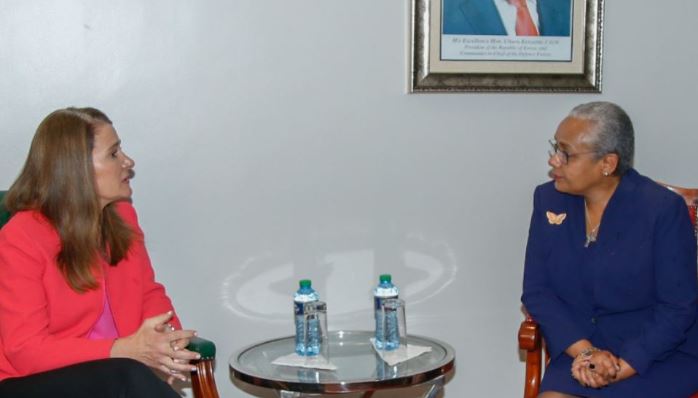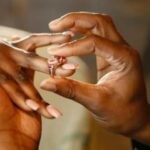
During the gathering, advocates are set to launch a new SDG Gender Index that ranks Kenya 97th out of 129 countries on gender equality.
Melinda Gates, the Co-Chair of the Bill & Melinda Gates Foundation, will attend the meeting. She shared her thoughts with the Star in an exclusive phone interview.
Below are some excerpts. Full interview HERE
Q: Looking at Kenya’s performance on the Gender Index – Kenya ranks 97th out of 129 countries – do you see hope or a more challenging situation?
A: I would say I see both to be honest. I am hopeful because Kenya is doing super well in certain parts of the indicator such as digital banking, which we know is super important for women. Kenya is one of the strongest on the continent on digital banking because Kenya had Mpesa basically before anyone else. So I’m hopeful when I see things like that. I’m hopeful when I see what Kenya is doing on family planning and how even with the devolution of health systems, the data is being pushed out of the district levels and progress is being made.
But I would also have liked to see Kenya higher up on this to be honest and I think there’s still obviously lots of room to go – the maternal mortality is quite concerning to me. So the way forward I think for Kenya is to look at gender. I’m thrilled President Kenyatta is committed to gender and making sure gender is part of the entire budget, whether it’s agriculture, digital financial services or women’s health – all of those things need to be invested in.
But I am hopeful Kenya will rise on this index in the next two years well ahead of other African nations.
You point out the high rates of women who use digital banking – higher rates than three-quarters of the world’s countries. Do you see this as satisfactory evidence of financial inclusion of women in the economy?
Yes, it’s the beginning of women being included in the economy. Well, they are included now but they need other things in terms of banking services. But this is exactly where you want to start, because we know a woman becomes more empowered when she has finances in her hand. She’ll tell you her husband sees her differently, she sees herself differently, and her sons see her differently. So to me this is totally the beginning of a revolution in terms of women having real access to the full range of financial services.
You point out the high rates of women who use digital banking – higher rates than three quarters of the world’s countries. Do you see this as satisfactory evidence of financial inclusion of women in the economy?
Yes, it’s the beginning of women being included in the economy. Well, they are included now but they need other things in terms of banking services. But this is exactly where you want to start, because we know a woman becomes more empowered when she has finances in her hand. She’ll tell you her husband sees her differently, she sees herself differently, and her sons see her differently. So to me this is totally the beginning of a revolution in terms of women having real access to the full range of financial services.
In Kenya Women actually account for only 21.8 per cent in the National Assembly. We have been trying without success to implement a constitutional amendment to ensure at least one third of members of National Assembly are of either gender. How important is this political participation for development?
I think in Kenya it’s up to Kenyans to determine how do they want their Parliament to look. At the end of the day, it’s a country level issue. But I think there’s a lot to learn from other countries. I mean, even in the United States still less than 25 per cent of our Congress is women and that shouldn’t be. Other countries like Senegal and Rwanda have a higher participation of women in Parliament. And we know, when women participate in politics they bring key issues like funding for women’s health, funding for children, paid family medical leave, policies that will be pro-family and pro-women while balancing that with business and government. And that’s why I think it’s important to have more women in Parliamentary houses all over the world.
Kenyan President may be attending the Women Deliver meeting in Vancouver this week. Do you have planned meeting with him, and are there gender-related issues you would discuss?
President Kenyatta hopefully will be in Canada, we are still waiting to confirm that. But if will speak with him about gender? I have spoken with him about it before, several times. I know the topics we would cover are contraceptives in the country, digital banking, financial services, data – making sure that he, other people and ministries are using data to measure, understand, invest and make decisions on behalf of women. I know we would also talk about women in agriculture because we know 50 per cent of farmers are women and I know agriculture is a huge part of the economy in Kenya.
You mentioned countries that perform well on gender index have invested in family planning. One of the programmes being supported by the Foundation is the FP2020. Are we close to achieving the goal of having 120 million additional women and girls to use contraceptives by 2020?
We are progressing on that goal, but I will be honest, it’s been harder than we expected. There was so much ground to be laid in the first two or three years. We announced that problem in 2012. There was no data system that existed. We had to collect data to understand if women had access to contraceptives and if so, which ones. For instance, even in your own country Kenya, the data system had to be built up and now we have women enumerators who are going round collecting data from women in the villages and townships to understand more about their lives and access to contraceptives, make sure they are not coerced. So it took us a while to lay that groundwork. So we are a bit behind on that goal but we do have 40 million more women with access to contraceptives. But honestly, I’m enthused to get to 2020 but I’m even more enthused to get to 2030 and have universal access.






